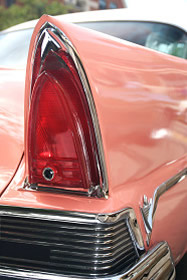Automobile Financing
Auto loan defaults to rise 7 percent in 2010
by Broderick Perkins

(1/6/2010) There a good chance the now expired "Cash for Clunkers" program gave you more for your old car than it was worth.
But there's also a chance the deal came with a new and not-so-improved car payment you can't afford.
For qualified trade-ins, the federal Cars Allowance Rebate System (CARS) gave new car buyers a credit of up to $4,500 toward the cost of a new more fuel efficient model.
But for some auto buyers that meant an extra bill or a larger payment than the tax credit could offset.
While the ratio of delinquent auto loan borrowers is relatively low, compared to delinquent home buyers and credit card holders, TransUnion's annual auto loan forecast predicts auto loan delinquencies of borrowers 60 or more days past due will rise by 7 percent in 2010.
TransUnion says CARs did give some car buyers a tax break, a more affordable car payment and better fuel economy. Tighter auto loan standards also helped car buyers finance only what they could truly afford.
However, even after you toss in the special federal tax deduction on the state and local sales and excise taxes on the purchase of new vehicle, other drivers still won't be able to steer clear of delinquency on their auto loan.
For them, advice from the Engine Repower Council could have saved some headaches. The council has always been able to crow about the potential savings that comes with swapping out your dead engine (or performing major auto repairs) for a new one -- even during the CARS program. The cost of a new engine or major work on a car to save it from the junk yard is a fraction of the cost of a new car.
"Delinquencies will rise in the second half of 2010 as economic pressures, along with traditional spending patterns of summer vacations, back to school and the holidays, will continue to strain consumers. While the rate of increase should be relatively mild, it is a cautionary number to those expecting an abrupt turnaround in the auto finance industry," said Peter Turek, automotive vice president in TransUnion's financial services group.
TransUnion says the forecast marks the fifth consecutive year the nation's 60-day auto loan delinquency rate will have either remained the same or increased from the previous year.
It hasn't dropped since the 2004-to-2005 period when the delinquency rate dropped 4.35 percent from 0.69 percent to 0.66 percent. This year, it's expected to rise to 0.92 percent from 0.86 percent in 2009.
Hit hardest will be the Midwest and Southeast, with Indiana suffering a 27.23 percent increase in the delinquency rate; Michigan, 26.74 percent; Kentucky, 22.31 percent and Georgia, 18.71 percent.
Least affected with be California, the only state expected to see a decrease in auto loan delinquencies. Other states expecting to see the least amount of increases in auto loan delinquencies are also states hard hit by the housing crisis - Florida and Nevada.
By year's end Mississippi, at 1.76 percent; Georgia 1.46 percent and Alabama, 1.40 percent will have the highest auto loan delinquency rates.
The lowest will be in Washington, D.C., 0.34 percent; North Dakota, 0.39 percent and South Dakota, 0.45 percent.
A resolute word of advice for those considering buying a car this year, comes from Eric Hoffman, spokesman for the AWARE (Americans Well-informed on Auto Retailing Economics) coalition, which helps consumers better understand the vehicle financing process.
"Consumers who take the time to research their financing options are more likely to be satisfied with their vehicle purchases," Hoffman says.
Other related articles:
Automotive Loans: Buying Vs Leasing
Automotive Loans: Dealer Incentives to Buy
Cost of Owning a Car on the Rise, Find Low Rate Auto Loan Online
Research your options when shopping for an auto loan
Feds to steer consumers away from predatory auto loans
Special Report: Hitting the Brakes on Auto Dealer Loans
Steer clear of car title loans

Automotive Loans: Trading in a Car
Automotive Loans: What Laws Protect Car Buyers?
Automotive Loans: Trade In or Sell a Car?
Automotive Loans: Is Zero Percent Financing Really Possible?
Automotive Loans: Determining a Down Payment
Automotive Loans: The Truth About "Add-Ons"
Automotive Loans: Top 5 Mistakes When Buying a Car
Automotive Loans: Shopping Online
Automotive Loans: Dealer Incentives to Buy
Automotive Loans: Car Buying Incentives
Automotive Loans: Should You Buy New or Used?
Automotive Loans: What to Know About Interest Rates
Automotive Loans: Negotiating a Loan with a Dealer
Automotive Loans: How Much Car Can You Afford?
Automotive Loans: Understanding Typical Loan Language
Automotive Loans: Types of Financing
Automotive Loans: Buying Vs Leasing
Automotive Loans: Applying for a Car Loan

Buying a Car: Standard and Extended Warranties
Car Buying: Financing Background and Steps
Leasing a Car: Two Types of Leases - Closed & Open
Buying a Used Car: Two Options
Buying a Car: 5 Steps to Find the Perfect Deal
Automobile Buying/Financing

5 Steps to Find the Perfect Car
Auto loan defaults to rise 7 percent in 2010
Auto Show Season Tips for Buyers
When is the Best Time to Buy a New Car?
Making a Vehicle Purchase? Enjoy These Helpful Tips
Chances are, your next car will be used. Drive a hard bargain
What your car is really saying
2012 President's Day auto sales among best ever
Special Report: Hitting the Brakes on Auto Dealer Loans
Auto Insurance
Buying Ins - Shopping for Insurance
Best Car Insurance Plan for You


